Austen 250 Reader Series: Emma (Chapters 27-36)
- Maizie Ferguson

- Aug 15, 2025
- 10 min read
Updated: Aug 22, 2025
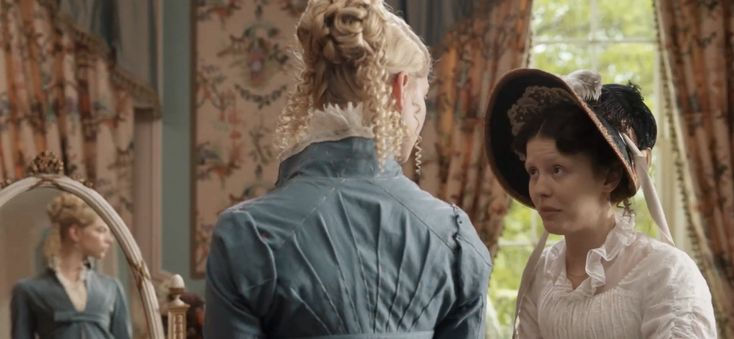
Welcome back, Janeites, to the Austen 250 Reader Series––our celebratory blog series for this 250th anniversary year––and to the latest installment of our content devoted to Austen's 1815 novel, Emma. Today, we shall cover chapters 27-36. Now let us begin!
We pick back up with Emma post-party and discover that perhaps our dear, persnickety heroine had been too rash––so she thinks––in previously considering the Coles too lowbrow for association. In the midst of remembering the evening with great gladness, Emma is soon visited by Harriet, who is in quite the tizzy. Why? Because a rumor has sprouted that a local family, the Coxes, have daughters who wish to marry Robert Martin. Despite the constant, explicit disapproval of the Martins from Emma, it becomes increasingly clear throughout the novel that Harriet is still very much interested in the goings-on of her dear friends. What could be more evident of this than her rush of panic at the thought that Robert Martin might marry one of the Cox girls, who Emma considers to be vulgar.
As a distraction, Emma brings Harriet to see the Bateses, stopping in the haberdashery en route. And who should they meet on their way but Mrs. Weston and Frank Churchill––who are also on their way to see the Bateses (or specifically Jane's piano) incidentally––and soon Miss Bates herself arrives, pleased at the prospect of company, chatting all the while.

Harriet, tempted by every thing and swayed by half a word, was always very long at a purchase; and while she was still hanging over muslins and changing her mind, Emma went to the door for amusement. [...] when Emma caught their eye.—Immediately they crossed the road and came forward to her; and the agreeableness of yesterday’s engagement seemed to give fresh pleasure to the present meeting. Mrs. Weston informed her that she was going to call on the Bateses, in order to hear the new instrument. (Ch. 27)
At the small home of Mrs. and Miss Bates, Emma observes the dynamics between Frank and Jane Fairfax, the former teasing the latter mercilessly, most particularly about the pianoforte and potentially mysterious origins of the instrument. The latter seeming to enjoy the repartee, which Emma notes as interesting. The house is full to the bursting already, but the Batses receive yet another visitor, none other than Mr. Knightley. He is come to ask after Jane's health, however when told of Frank's presence, he leaves immediately. Curious...
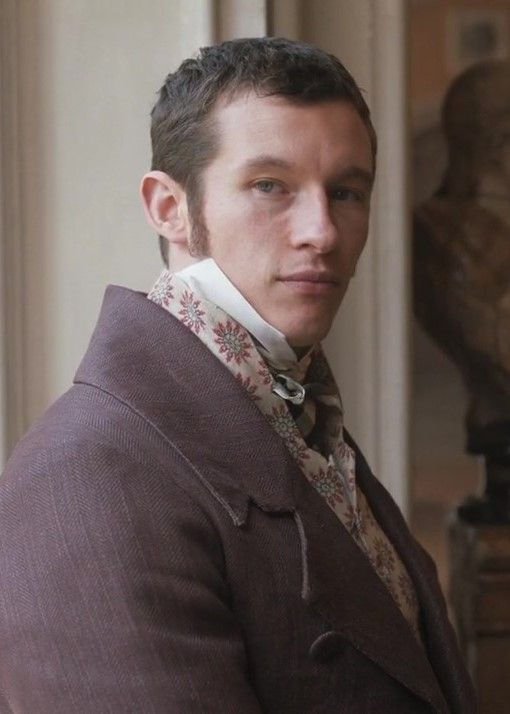
The appearance of the little sitting-room as they entered, was tranquillity itself; Mrs. Bates, deprived of her usual employment, slumbering on one side of the fire, Frank Churchill, at a table near her, most deedily occupied about her spectacles, and Jane Fairfax, standing with her back to them, intent on her pianoforte. Busy as he was, however, the young man was yet able to shew a most happy countenance on seeing Emma again.
“This is a pleasure,” said he, in rather a low voice, “coming at least ten minutes earlier than I had calculated. You find me trying to be useful; tell me if you think I shall succeed.” (Ch. 28)
Frank's flippant comments regarding a ball turn into fully formed plans, with Emma gleefully offering her advice and assistance. The Crown Inn will be the place of the hour, which causes Mr. Woodhouse much anxiety due to the draughts found within such a place. The ball being terrible for health on all accounts, he decides to abstain from attending. Jane Fairfax and Miss Bates are asked of their opinions on the proceedings, of which they approve. Then Frank asks for Emma to allow him the ball's first two dances, an act thought significant by his father and stepmother, as well as Emma herself.
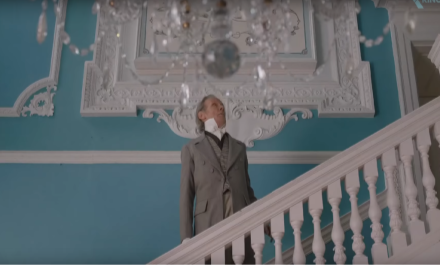
It may be possible to do without dancing entirely. Instances have been known of young people passing many, many months successively, without being at any ball of any description, and no material injury accrue either to body or mind;—but when a beginning is made—when the felicities of rapid motion have once been, though slightly, felt—it must be a very heavy set that does not ask for more. (Ch. 29)
A date is settled upon and it is the topic of conversation among the invited parties. Mr. Knightley, however, is anything but looking forward to the evening. While it is an irritant as far as Emma is concerned, it juxtaposes greatly to Jane Fairfax's mounting excitement. With a healthy dash of pleasure, Miss Woodhouse believes these disparate emotions to be proof that Mr. Knightley is not in love with Jane, as Mrs. Weston has insinuated. Unfortunately, a letter soon arrives for Frank, whose aunt beckons him home due to her increasing ill health.
As he heads out of town, Mr. Churchill visits Emma at Hartfield; Frank seems on the brink of sharing news of great import, but ends up not revealing anything grave. This gets Emma's mind turning in rapid spheres of possibility. Between the––could it have been––near declaration of love and missing Frank while he is away, Emma realizes she might be in love with him. On the opposite side of the spectrum, however, Mr. Knightley seems relieved by Frank's absence, though he is sensitive to the melancholy of others, notably Emma.
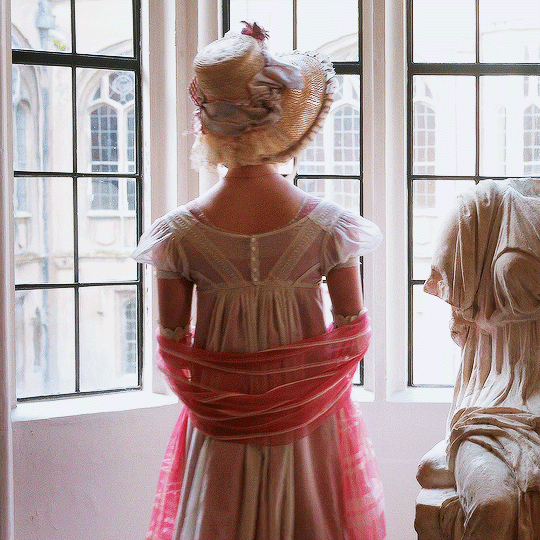
It had been a very happy fortnight, and forlorn must be the sinking from it into the common course of Hartfield days. To complete every other recommendation, he had almost told her that he loved her. What strength, or what constancy of affection he might be subject to, was another point; but at present she could not doubt his having a decidedly warm admiration, a conscious preference of herself; and this persuasion, joined to all the rest, made her think that she must be a little in love with him, in spite of every previous determination against it.
“I certainly must,” said she. “This sensation of listlessness, weariness, stupidity, this disinclination to sit down and employ myself, this feeling of every thing’s being dull and insipid about the house!— I must be in love [...]”( Ch. 30)
It is a great difficulty for a matchmaker at heart to truly forgo the practice, even when it pertains to their own life. Emma constantly daydreams about the potentiality of her being with Frank, however each theoretical situation she comes up with is ended by herself. Hearkening back to her conversation with Harriet earlier in the novel, Emma is reminded of the joy and great independence of being single.
Frank's absence is soon forgotten by many as Mr. Elton arrives back in town, this time with his new wife in tow. This agitates Harriet––for obvious reasons––and Emma does all in her power to help her dear friend leave behind thoughts of the rude, self-important vicar.
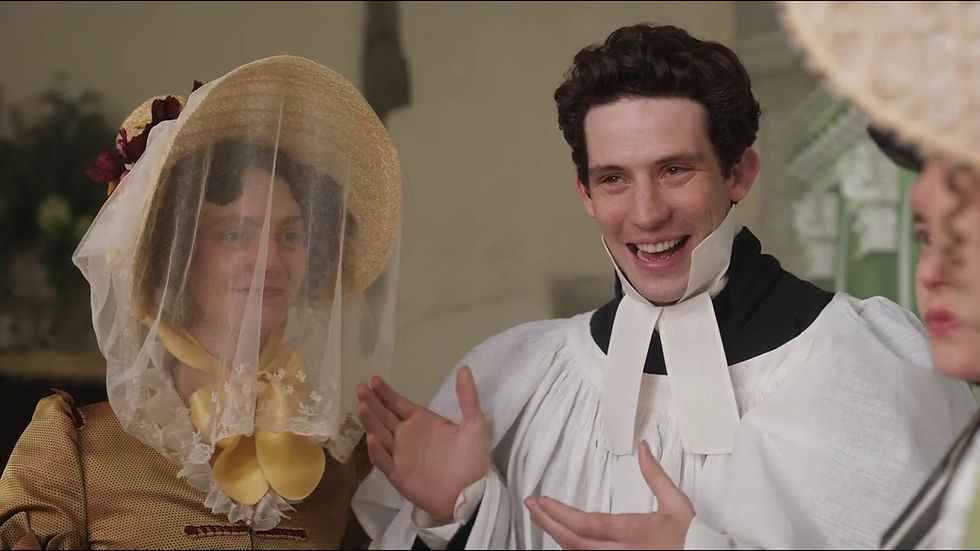
There was hardly time to talk over the first letter from Enscombe before “Mr. Elton and his bride” was in every body’s mouth, and Frank Churchill was forgotten. Emma grew sick at the sound. She had had three weeks of happy exemption from Mr. Elton; and Harriet’s mind, she had been willing to hope, had been lately gaining strength. With Mr. Weston’s ball in view at least, there had been a great deal of insensibility to other things; but it was now too evident that she had not attained such a state of composure as could stand against the actual approach—new carriage, bell-ringing, and all. (Ch. 31)
Once Mrs. Elton arrives in Highbury, Emma and Harriet pay the obligatory social call. It is a terribly unpleasant meeting, especially due to the awkwardness of Mr. Elton, and Emma leaves with a less-than-sparkling opinion of the vicar's wife. Mrs. Elton soon visits Hartfield for tea and Emma's ill-opinion of her is cemented. Vulgar and superficial, Mrs. Elton was of the highest ranking family in her previous circumstances, which results in her over-familiarity and a lack of propriety in conversation with Emma, especially with regard to the referencing of other individuals in their social circle. Mrs. Elton's behavior causes rifts in the social order of Highbury, however as a new bride, she is "first in company", as stated by Mr. Woodhouse.
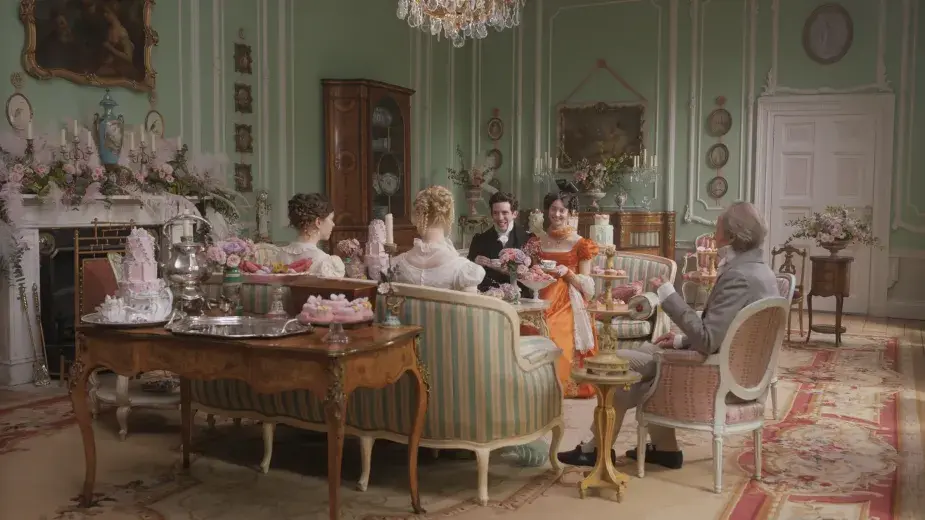
Mrs. Elton was a vain woman, extremely well satisfied with herself, and thinking much of her own importance; that she meant to shine and be very superior, but with manners which had been formed in a bad school, pert and familiar; that all her notions were drawn from one set of people, and one style of living; that if not foolish she was ignorant, and that her society would certainly do Mr. Elton no good. (Ch. 32)
It does not take much longer for Emma to foster a firm distaste for Mrs. Elton, which Miss Woodhouse does not entirely hide. While ostentatious, to her credit, Mrs. Elton does have a great deal of sense and picks up on Emma's dislike of her. In response, she attaches to Jane Fairfax, who seems to have no qualms on such a tasteless social patroness. A letter comes for Jane inviting her to join her friends, the Dixons, in Ireland, but this is declined.
Soon, Emma, Mrs. Westons, and Mr. Knightley converse on the subject of Mrs. Elton and Jane Fairfax's juxtaposition of attention. When Mr. Knightley offers a positive word on Jane's behalf, Emma jumps at the chance to tease her old friend, as he often teases her. The jab in jest does not land as Emma expected, however, with Mr. Knightley greatly protesting any romantic insinuations and professing Miss Fairfax to be too reserved for her own good. Aha... Emma, 1, Jane, 0... or so thinks Emma, who is pleased to find a flaw in her rival...

“That will never be, however, I can assure you. Miss Fairfax, I dare say, would not have me if I were to ask her—and I am very sure I shall never ask her.”
Emma returned her friend’s pressure with interest; and was pleased enough to exclaim, “You are not vain, Mr. Knightley. I will say that for you.”
He seemed hardly to hear her; he was thoughtful—and in a manner which shewed him not pleased, soon afterwards said,
“So you have been settling that I should marry Jane Fairfax?”
“No indeed I have not [...]" (Ch. 33)
A party at Hartfield is soon planned––in order to pay Mrs. Elton the correct social attention more than anything––and when Harriet is unable to attend, Emma extends her invitation to Jane Fairfax. Emma's sister Isabella and her husband Mr. John Knightley are also in the neighborhood and make their appearance. During the course of the evening's conversation, it is discovered that Jane often walks to the post office to gather her letters, even in the rain, a fact that Miss Fairfax is scolded for by Mrs. Elton. The latter declares that now Jane's letters will be gathered by the Eltons' servant, a plan that Jane herself opposes, albeit kindly. Why would she be so very hesitant for someone else to see her letters, Emma wonders; a guise of impenetrable mystery drapes itself once again over Jane Fairfax.

By this time, the walk in the rain had reached Mrs. Elton, and her remonstrances now opened upon Jane.
“My dear Jane, what is this I hear?—Going to the post-office in the rain!—This must not be, I assure you.—You sad girl, how could you do such a thing?—It is a sign I was not there to take care of you.”
Jane very patiently assured her that she had not caught any cold.
“Oh! do not tell me. You really are a very sad girl, and do not know how to take care of yourself.—To the post-office indeed! [...]” (Ch. 34)
After the dinner, the women gather in the drawing room to chat. Mrs. Elton––not to be foiled in her plans of assistance to Jane Fairfax––promises to find the girl a governess job. Again, Jane quietly protests, saying that no inquiries will be made until the summer. Later, the Westons arrive, with a letter from Frank in tow. Mr. Churchill will soon return to Highbury, an announcement which draws varying emotions from all in the party. One can guess how Emma and Mr. Knightley, respectively, each feel about the matter...
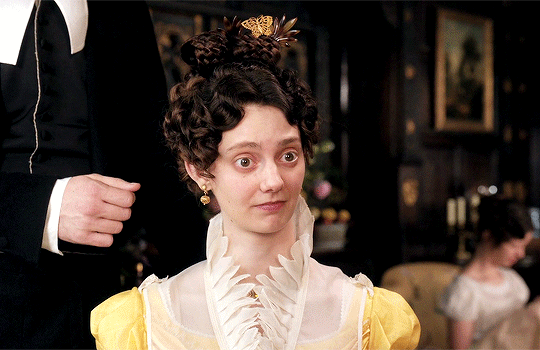
When the ladies returned to the drawing-room after dinner, Emma found it hardly possible to prevent their making two distinct parties;—with so much perseverance in judging and behaving ill did Mrs. Elton engross Jane Fairfax and slight herself. She and Mrs. Weston were obliged to be almost always either talking together or silent together. Mrs. Elton left them no choice. (Ch. 35)
Mr. Weston and Mrs. Elton discuss the persnickety nature of ladies of fortune––such as Mrs. Churchill and, of course, the relatives of Mrs. Elton that she simply had to mention––and their conversation is quite revealing of both temperaments. Mr. Weston, always jovial and kind; Mrs. Elton, vindictive and vainglorious. The conversation could have easily continued on, however tea is served. The chapter concludes with Mr. John Knightley and Emma speaking on the topic of the young Knightley boys, who will soon be staying with her at Hartfield.

“Well, Emma, I do not believe I have any thing more to say about the boys; but you have your sister’s letter, and every thing is down at full length there we may be sure. My charge would be much more concise than her’s, and probably not much in the same spirit; all that I have to recommend being comprised in, do not spoil them, and do not physic them.”
“I rather hope to satisfy you both,” said Emma, “for I shall do all in my power to make them happy, which will be enough for Isabella; and happiness must preclude false indulgence and physic.”(Ch. 36)
Stay tuned for the next post, in which I will discuss Chapters 37-45, released on August 29th. A reading guide can be found here. Now, I implore you, please share your thoughts in the comments section below. I would love to hear anything and everything, dear readers!
If you enjoy our content, please consider donating. Your donations support the Jane Austen Summer Program, Jane Austen & Co., Jane Austen for Teachers, and Jane Austen's Desk. Contributing to this fund will help us keep our costs and the ticket prices for the Jane Austen Summer Program (JASP) as low as possible. It will also help ensure that JASP continues to exist in future years.





Comments